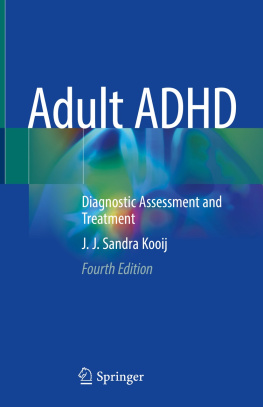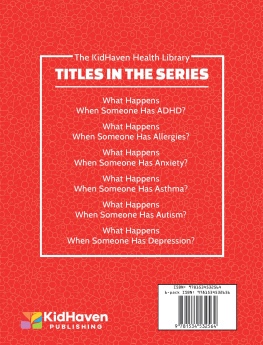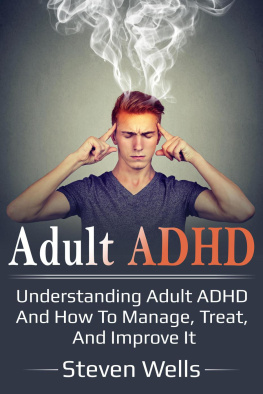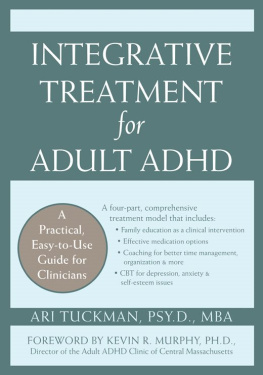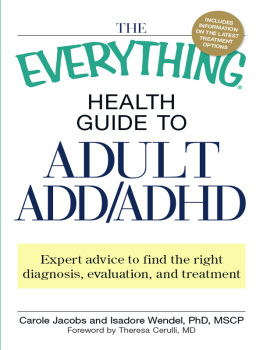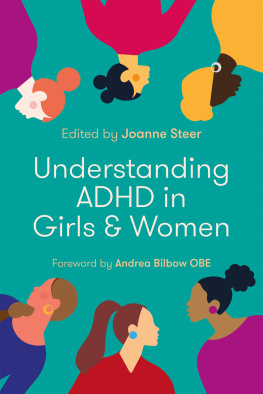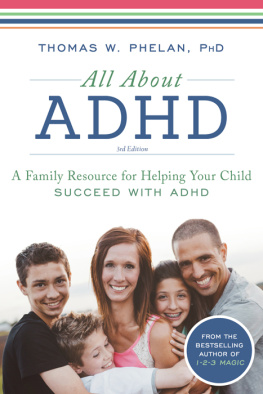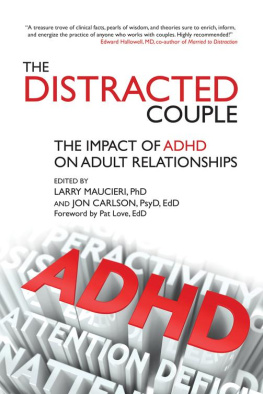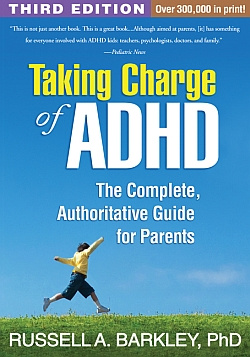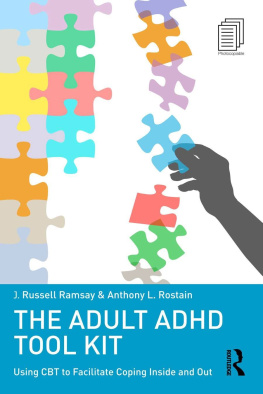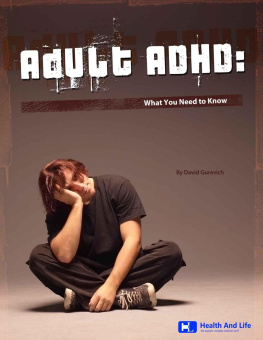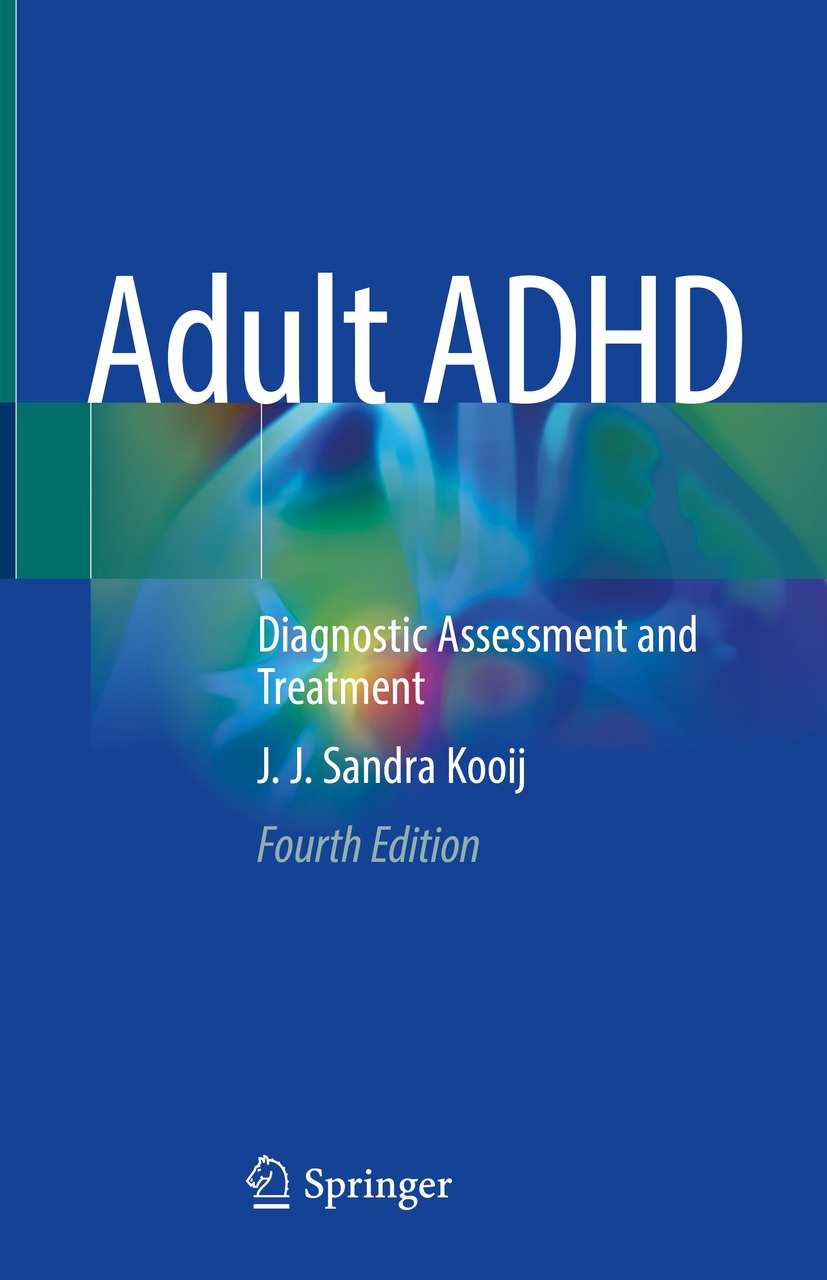J. J. Sandra Kooij
Adult ADHD
Diagnostic Assessment and Treatment
4th ed. 2022

Logo of the publisher
J. J. Sandra Kooij
VUMc, Amsterdam University Medical Center, Amsterdam, The Netherlands
ISBN 978-3-030-82811-0 e-ISBN 978-3-030-82812-7
https://doi.org/10.1007/978-3-030-82812-7
The Editor(s) (if applicable) and The Author(s), under exclusive license to Springer Nature Switzerland AG 2002, 2003, 2009, 2010, 2013, 2022
This work is subject to copyright. All rights are solely and exclusively licensed by the Publisher, whether the whole or part of the material is concerned, specifically the rights of translation, reprinting, reuse of illustrations, recitation, broadcasting, reproduction on microfilms or in any other physical way, and transmission or information storage and retrieval, electronic adaptation, computer software, or by similar or dissimilar methodology now known or hereafter developed.
The use of general descriptive names, registered names, trademarks, service marks, etc. in this publication does not imply, even in the absence of a specific statement, that such names are exempt from the relevant protective laws and regulations and therefore free for general use.
The publisher, the authors and the editors are safe to assume that the advice and information in this book are believed to be true and accurate at the date of publication. Neither the publisher nor the authors or the editors give a warranty, expressed or implied, with respect to the material contained herein or for any errors or omissions that may have been made. The publisher remains neutral with regard to jurisdictional claims in published maps and institutional affiliations.
This Springer imprint is published by the registered company Springer Nature Switzerland AG
The registered company address is: Gewerbestrasse 11, 6330 Cham, Switzerland
Foreword
Sandra Kooij is a leading European psychiatrist who pioneered the development of clinical services for adults with ADHD. She is inspirational in this area, playing a lead role in the development of clinical networks and training programmes across Europe. Her work is built on a background of clinical and epidemiological research that has provided further characterisation of the symptoms, disorders and functional impairments associated with ADHD in adults. This book clearly benefits from this experience and includes many important insights as well as practical guidance on clinical management.
ADHD in adults is one of the most prevalent adult mental health disorders, with an estimated worldwide prevalence of 34%. Furthermore, the disorder is associated with the development of numerous comorbid psychopathologies including anxiety, depression, substance abuse and personality disorders. The strong association with addiction and the high rates of ADHD within the criminal justice system highlight the considerable impact of ADHD on some of the most difficult mental health problems facing society. ADHD also affects people in their daily lives due to difficulties in regulating arousal and attention and problems with planning, memory, time-keeping, mood regulation, low self-esteem and poor impulse control. ADHD is highly symptomatic with reports of feeling restless, ceaseless and unfocused thought processes and insomnia often leading to mistaken diagnoses. Yet, ADHD shows highly characteristic responses to both pharmacological and non-pharmacological treatments.
The translation of this book into English is very timely. Recognition and treatment of ADHD in adults has not received sufficient attention, and as a result, many people with ADHD have struggled to obtain the treatment they require. This continues to be a problem leading to persistence of impairments and considerable distress to individuals and their families. There is, however, growing interest in ADHD and its clinical management among adult mental health-care professionals.
This book provides a concise yet detailed summary of the diagnosis and treatment of ADHD in adults. It is no longer acceptable to ignore ADHD as an adult condition or mistake it for other mental health disorders. We now know that correctly targeted treatments for ADHD are effective at improving daily function and quality of life for many people. As such this book is an essential resource for all those engaged in adult mental health.
Philip Asherson
London, UK
Foreword
This book not only serves as an excellent guide for recognising, diagnosing and treating adult ADHD. It also contains fifteen years of history concerning the process leading up to thisa process that I was able to witness at close quarters and that instilled in me a great admiration for the strength and perseverance of psychiatrist Dr. Sandra Kooij, the author of this book.
Sandra referred to research carried out abroad and expressed the ambition to also prove in the Netherlands that ADHD continues into adulthood and brings suffering to a considerable number of people through dysfunctioning and underachievement. But she also pointed out that treatment provides these people with the opportunity to take a different course in life and to develop new certainties and talents. By offering this perspective, Sandra Kooij has become a symbol of hope and new insights for adults with ADHD in the Netherlands.
It did not end there, because, under her supervision, a considerable amount of scientific research has been carried out, there is increasing evidence for the validity of the diagnosis, treatment models have been developed, diagnostic assessment and self-report instruments have been tested and a mental health-care infrastructure in which adults can ask their questions in various locations in the Netherlands was put into place.
Adult ADHD aims to take the next step in the process towards creating a self-evident place for the treatment of adult ADHD in the mental health-care sector. This book provides education programmes with the possibility of including the disorder in their curriculums, so that every psychologist and psychiatrist will eventually know about the seriousness of these problems and their influence on a considerable number of relationships and families. Sandra Kooij concluded in her first study that the adults who came to her department had on average been looking for help for as long as twelve and a half years. The book here before you provides you with an excellent tool for bringing this number down considerably. It is time to start working with it.
Arga Paternotte
Rotterdam, The Netherlands
Preface
The Fourth Edition
Recent research has shown that in the Netherlands adult ADHD is found in 5% of the general population and in approximately 20% of psychiatric and addicted patients. If left untreated, adult ADHD results in impairment of patients, places a burden on the patients environment and generates higher costs for society as a result of absence, illness and incapacity for work. Effective treatment of adult ADHD is possible and improved drugs are available, but still only a few mental health professionals have been trained in the diagnostic assessment and treatment of this common disorder. This leads to underdiagnosis and undertreatment of adult ADHD, which increases the risk of chronicity.

